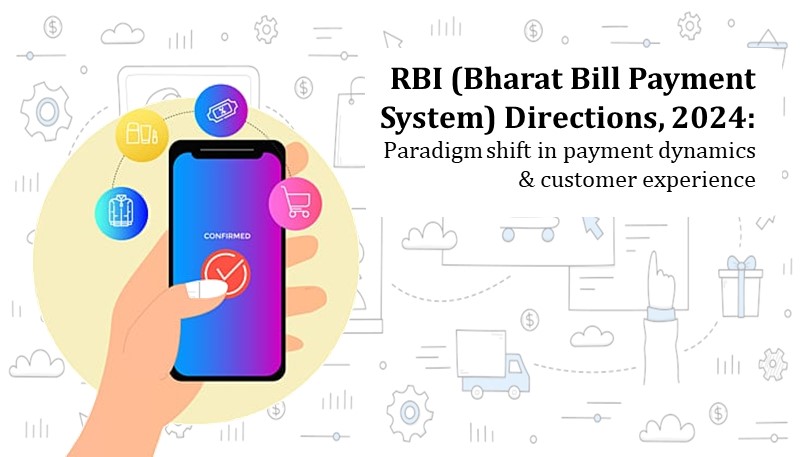RBI (Bharat Bill Payment System) Directions, 2024: Paradigm shift in payment dynamics and customer experience

In the backdrop of significant developments in the payments system, the RBI has reformed its regulatory framework for Bharat Bill Payment System (“BBPS”) which is an ‘anytime anywhere’ bill payments platform operational since August 2017. The new RBI (Bharat Bill Payment System) Directions, 2024 (“BBPS Directions”) seek to streamline the process of bill payments, enable greater participation, and enhance customer protection among other changes.
Under the revised norms, NPCI Bharat Bill Pay Limited (“NBBL”) and all Bharat Bill Payment Operating Units (“BBPOUs”) are required to adhere to the BBPS Directions which are directly governing the operation and management of the BBPS starting from 01th April, 2024. BBPS is a platform for integrated bill payment enabling payment or collection of bills through various channels like mobile apps, bank branches, etc. via different payment modes like UPI, internet banking, cards, etc.[1] NBBL is the entity that is authorised as the Payment System Provider for BBPS and is the authorised Bharat Bill Pay Central Unit (“BBPCU”)[2]. Any entity, other than a biller, which operates a system for payment of bills outside the scope of BBPS would be a “payment system” and will further require an authorization under the Payment and Settlement Systems Act, 2007 (“PSSA”).[3]
BBPS Directions now specifically provide the following participants as the BBPCU and BBPOUs in the payment system:[4]
-
- Bharat Bill Pay Central Unit (“BBPCU”): NBBL will serve as the intermediary platform linking customers and billers through Customer Operating Units (“COUs”)[5] and Biller Operating Units (“BOUs”)[6] NBBL will also manage clearing and settlement activities for transactions facilitated through BBPCU. BBPCU is required to:
- establish regulations and technical standards to govern the participation criteria and system operations;
-
provide guarantee on the settlement of transactions through NBBL;
-
ensure that each transaction is allocated a BBPS reference number;
-
prohibit fund flow through Technology Service Providers and
-
provide a dispute resolution framework.
- Bharat Bill Pay Central Unit (“BBPCU”): NBBL will serve as the intermediary platform linking customers and billers through Customer Operating Units (“COUs”)[5] and Biller Operating Units (“BOUs”)[6] NBBL will also manage clearing and settlement activities for transactions facilitated through BBPCU. BBPCU is required to:
- Bharat Bill Payment Operating Units (BBPOUs): Various entities including banks, non-bank Payment Aggregators (PAs) and other authorized entities can participate as BBPOUs which are Operating Units in BBPS. Banks and non-bank PAs which intend to operate as BBPOUs will not be required to take separate authorization. However, they are required to inform the Department of Payment and Settlement Systems before commencing the BBPS operations. These BBPOUs can function either as a COU or a BOU or both.[7]
-
- BOUs are responsible for:
- onboarding billers and
- ensuring compliance with due diligence requirements.
- COUs offer digital/physical interfaces for customers, ensure customers have access to all billers on BBPS, provide a dispute resolution system and hold responsibility for the actions of their agent institutions. Each entity’s roles and responsibilities are important for maintaining BBPS’s integrity and efficiency to ensure smooth bill payments and consumer protection within the system.
- BOUs are responsible for:
The BBPS Directions also provide for a centralised complaint management and dispute resolution mechanism for its participants.[8] NBBL is mandated to establish a centralized end-to-end complaint mechanism aligned with the RBI’s guidelines on Online Dispute Resolution (ODR) System for Digital Payments. This framework aims to efficiently manage complaints related to digital payments. Further, all participating COUs and BOUs are required to integrate into NBBL’s centralized system to facilitate the resolution of disputes according to the established framework. The BBPS reference number, which is generated during the transaction, will be used for tracking and resolving disputes initiated. Additionally, COUs and BOUs must adhere to the prescribed timelines for handling failed transactions as per the RBI’s circular on Harmonisation of Turn Around Time (TAT) and customer compensation, for failed transactions using authorised Payment Systems dated September 20, 2019.
These Directions promote broader participation by expanding its scope and enabling non-bank payment aggregators (PAs) to participate in the system as operating units and covers all entities (other than billers) that operates a payment system for bills outside of the BBPS by ensuring that such entities mandatorily take authorization under the PSSA. Further, by introducing an efficient and centralised dispute resolution mechanism, these Directions ensure consumer protection. Overall, by addressing the emerging challenges, the new BBPS Directions promote efficiency and smooth functioning of payment ecosystem.
[1] Clause 4(d) of the 2024 Directions
[2] Clause 4(b) of the 2024 Directions
[3] Clause 3 of the 2024 Directions
[4] Clause 5 of the 2024 Directions
[5] Clause 4(c)(ii) of the 2024 Directions
[6] Clause 4 (c)(i) of the 2024 Directions
[7] Clause 4(c) of the 2024 Directions
[8] Clause 8 of the 2024 Directions
Written by: Pragya Saraf
Co-Authored by: Amiya Mukherjee
Disclaimer
This content is intended for informational purposes only and does not constitute a legal opinion. Despite our efforts to maintain accuracy, we do not make representations, warranties or undertakings regarding the quality, completeness or reliability of the content. Readers are encouraged to seek legal counsel prior to acting upon any of the information provided herein. This content, including the design, text, graphics, their selection and arrangement, is Copyright 2024, Lexplosion Solutions Private Limited or its licensors. ALL RIGHTS RESERVED, and all moral rights are asserted and reserved.
For any clarifications, please reach out to us at 91-33-40618083 or inquiries@lexplosion.in. Refer to our privacy policy by clicking here.